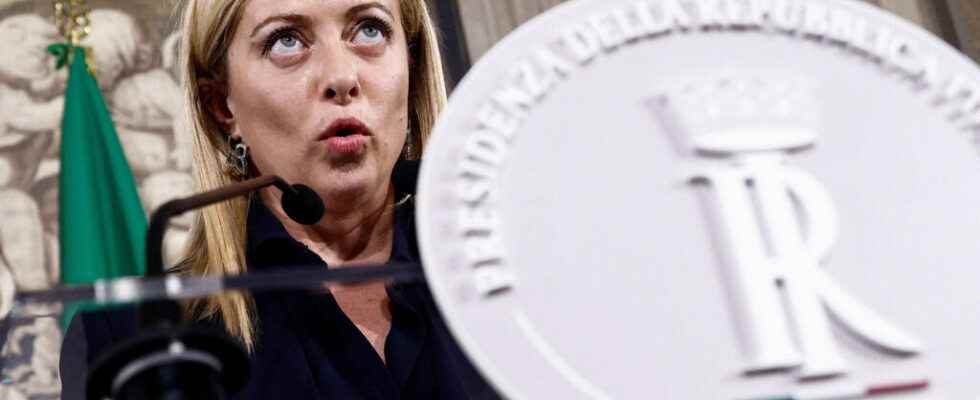The European Union has said it is ready to cooperate with the new eurosceptic government of Giogia Meloni, who was sworn in on Saturday 22 October and who is due to take up his new duties on Sunday.
Since Giorgia Meloni was sworn in as new board chair in Rome, few capitals reacted. On the other hand, the congratulations coming from Brussels are multiplying as one might expect, reports our correspondent in Brussels, Pierre Benazet.
The leaders of the three European institutions – Commission, Council and Parliament – have all issued an official message. ” Work together writes Charles Michel, the President of the European Council. At the Commission, Ursula von der Leyen is counting on “ constructive cooperation » and in Parliament, Roberta Metsola wants « overcome all difficulties “.
Congratulations to @GiorgiaMeloni on her appointment as Italian Prime Minister, the first woman to hold the post.
I count on and look forward to constructive cooperation with the new government on the challenges we face together.
—Ursula von der Leyen (@vonderleyen) October 22, 2022
But behind this obligatory exercise, EU leaders let their concerns shine through. And it is first towards Italy’s economic situation that all eyes are on Brussels. Italy’s debt has now reached the staggering level of 150% of gross domestic product, which is higher than Greece’s debt when its public finance crisis took off in 2010. But this time it is is the third largest economy in the Union which represents a systemic risk for all 27. And campaign proposals of the new President of the Council do not stop worrying, since Giorgia Meloni wants to increase public spending, reform the stability pact for the euro zone and renegotiate the recovery plan.
The EU nevertheless wants to reassure itself by asserting that the new Italian Economy Minister Giancarlo Giorgetti has always supported Mario Draghi and could therefore pursue part of his economic policy praised by the Europeans. The reputation of this pro-Brussels figure will not be too much. Like many of its neighbors, the urgency in Italy is to reduce the weight of energy bills for households and businesses. The employers’ organization Confindustria warns that 120,000 of them risk seeing their fixed costs multiply by five this winter. What threaten the existence of many of them.
► Read also: Headlines: Giorgia Meloni, a far-right woman at the head of the Italian government
Dangerous Liaisons
Another reason for concern for European leaders: the relations that certain members of the Italian coalition have with the Kremlin, which could have internal consequences in the Union. We remember in the European Parliament risky statements by Silvio Berlusconi and we see with concern his declarations of friendship this week again with Vladimir Putin. The European Commission also underlined in passing that the vodka sent to the former President of the Council by the Kremlin constituted a violation of the embargo on imports of spirits from Russia.
For his part, Matteo Salvini did not hesitate in September to criticize the EU sanctions against Russia, which had encouraged the Hungarian Viktor Orban to hope that it would be possible to put an end to them thanks in support of Italy. But the appointment of former European Commissioner Antonio Tajani for Foreign Affairs is made to allay the fears of Europeans who are also counting on the pro-NATO positions of Giorgia Meloni, whose party remains after all the heavyweight of the coalition.
On the other hand, one imagines more a recomposition of the political landscape of the EU and a refocusing on the concerns of the countries of central Europe which want to weigh more on the new orientations of the Union. Poland is also one of the first countries to have sent congratulations to Rome this Saturday.
